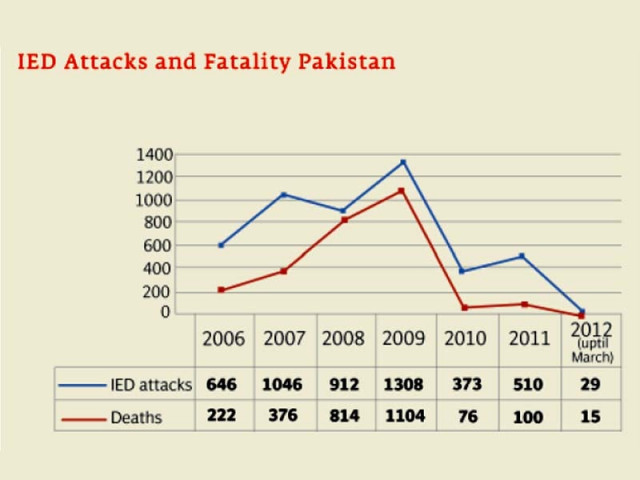Washington to help Pak army fight threat of IEDs
JIEDDO Director Lt Gen Michael Barbero says Pakistan witnesses highest number of IED blasts.

Washington to help Pak army fight threat of IEDs
In a bid to counter improvised explosive devices (IED) blasts, the US Department of Defence’s Joint Improvised Explosives Devices Defeat Organisation (JIEDDO) Director Lt Gen Michael Barbero announced that the US has agreed to develop a framework of cooperation with the Pakistani military.
Speaking at an event at the Atlantic Council, Gen Barbero said that after Afghanistan, Pakistan has witnessed the most IED blasts. The director added that in the past two years there has been a substantial increase in IED blasts, with 16,000 just taking place in 2011, whereas June 2012 has seen a record surge compared to previous years. He said, however, that casualties from IEDs have decreased.
The related graph explains the number of IED blasts in Pakistan and Afghanistan. Interestingly, there is a marginal difference between the number of blasts and the death toll in Pakistan. On the other hand, the gap between the death toll and the number of blasts in Afghanistan is substantially large.
When commenting on Pakistan, Gen Barbero said that the US is prepared to provide training and equipment to Pakistan to help counter IEDs, adding that some equipment has already been transferred to the country.
The JIEDDO director, who met Interior Minister Rehman Malik in Washington last month, said that Pakistan has developed a national strategy to counter IEDs, but it needs resources for effective implementation of the plan.
“This (IEDs) is a mutual threat,” said Gen Barbero. “We must cooperate to go after both, the money and networks in Pakistan that threaten the Pakistani military and Nato.”
He added that there is a dire need for the US and Pakistan to move beyond mere discussion and to co-operate over the issue.
Chemical composition
“[Up to] 84% of IEDs in Afghanistan are homemade,” the JIEDDO Director pointed out, adding that more than 59% are ammonium nitrate-based.
Gen Barbero said that the US has also seen potassium chlorate, used in manufacturing matches, being used by the Haqqani network in Regional Command East in Afghanistan for IEDs, a material that comes
from Pakistan.
He informed that the US is also talking to the fertilizer industry on the issue of IEDs.
In response to a question, he said that even though Pakistan had taken steps like changing bags and adding numbers to them, it didn’t bring a change in the amount of fertiliser entering Afghanistan.
Published in The Express Tribune, October 19th, 2012.



















COMMENTS
Comments are moderated and generally will be posted if they are on-topic and not abusive.
For more information, please see our Comments FAQ